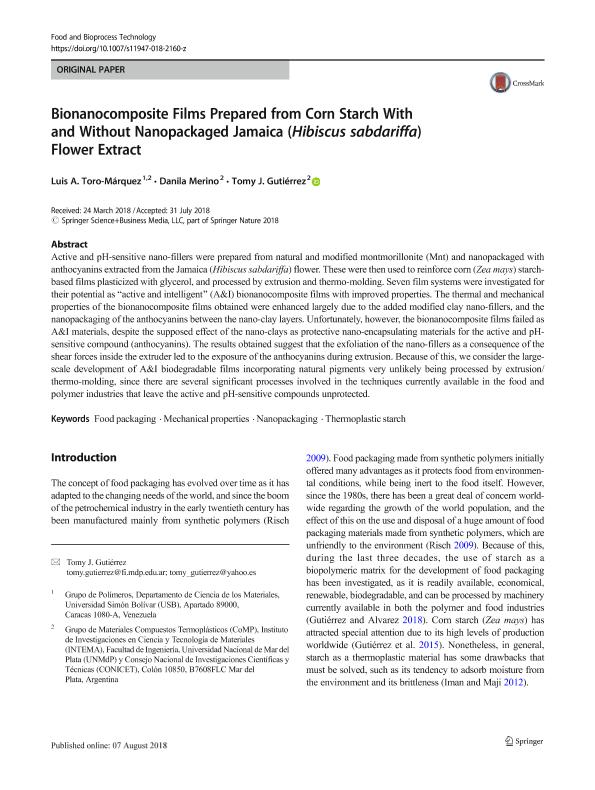Artículo
Bionanocomposite films prepared from corn starch with and without nanopackaged Jamaica (Hibiscus sabdariffa) flower extract
Fecha de publicación:
07/08/2018
Editorial:
Springer
Revista:
Food and Bioprocess Technology
ISSN:
1935-5130
Idioma:
Inglés
Tipo de recurso:
Artículo publicado
Clasificación temática:
Resumen
Active and pH-sensitive nano-fillers were prepared from natural and modified montmorillonite (Mnt) and nano-packaged with anthocyanins extracted from the Jamaica (Hibiscus sabdariffa) flower. These were then used to reinforce corn (Zea mays) starch-based films plasticized with glycerol, and processed by extrusion and thermo-molding. Seven film systems were investigated for their potential as "active & intelligent" (A&I) bionanocomposite films with improved properties. The thermal and mechanical properties of the bionanocomposite films obtained were enhanced largely due to the added modified clay nano-fillers, and the nano-packaging of the anthocyanins between the nano-clay layers. Unfortunately, however, the bionanocomposite films failed as A&I materials, despite the supposed effect of the nano-clays as protective nano-encapsulating materials for the active and pH-sensitive compound (anthocyanins). The results obtained suggest that the exfoliation of the nano-fillers as a consequence of the shear forces inside the extruder led to the exposure of the anthocyanins during extrusion. Because of this, we consider the large-scale development of A&I biodegradable films incorporating natural pigments very unlikely being processed by extrusion/thermo-molding, since there are several significant processes involved in the techniques currently available in the food and polymer industries that leave the active and pH-sensitive compounds unprotected.
Palabras clave:
Food packaging
,
Mechanical properties
,
Nanopackaging
,
Thermoplastic starch
Archivos asociados
Licencia
Identificadores
Colecciones
Articulos(INTEMA)
Articulos de INST.DE INV.EN CIENCIA Y TECNOL.MATERIALES (I)
Articulos de INST.DE INV.EN CIENCIA Y TECNOL.MATERIALES (I)
Citación
Toro Márquez, Luis A.; Merino, Danila; Gutiérrez Carmona, Tomy José; Bionanocomposite films prepared from corn starch with and without nanopackaged Jamaica (Hibiscus sabdariffa) flower extract; Springer; Food and Bioprocess Technology; 11; 11; 7-8-2018; 1955-1973
Compartir
Altmétricas




